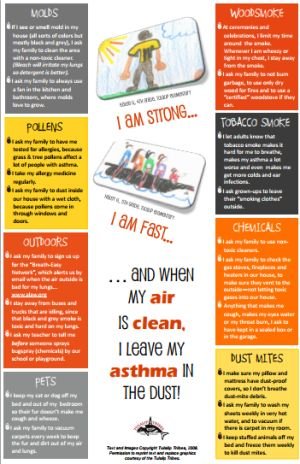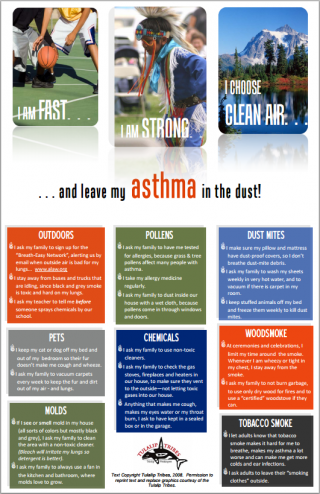Spotlight on Tulalip Tribes of Washington's Innovative Tribal Program for Healthy Homes Working Group
On this page:
- Program Champion
- Feature: Asthma in Tribal Communities
- Program Summary
- Key Strategies
- Posters for Your Own IAQ Tribal Program
Program Champion

Gillian has supported the Tulalip Indoor Air Program for more than 10 years, and though helping people is part of her job, it's also her passion. Working with other Tribal staff and members has inspired her to form the Healthy Homes Working Group.
- "I've seen the adverse impact that asthma has on the quality of life of kids and their families living with asthma. Knowing that simple changes in a home environment can make people's lives better is very powerful – we want to share that with our community members so they can lead healthier lives unencumbered by chronic asthma care." Gillian Mittelstaedt
Feature: Asthma in Tribal Communities
Implementing basic strategies can help create healthier homes. Listen as Gillian describes successes in asthma management and how she forged partnerships to create the Tribal Healthy Homes Northwest Working Group to improve health in her community.
- Watch the video on AsthmaCommunityNetwork.org
Program Summary
The Tulalip Tribes Indoor Air Program focuses on culturally relevant education and outreach, with the goal of reducing environmental exposures that can induce and exacerbate health problems such as asthma. To increase the impact of their program and to help regional Tribes improve their indoor air programs, Tulalip recently initiated the Healthy Homes Working Group. The Working Group will give Tribes the opportunity to exchange research and best practices, highlight strategies, successes and challenges in IAQ outreach and education, and create a model for effective home interventions in Tribal communities. By pooling their resources and forming a Tribally-led partnership, they aim to substantially reduce exposures to indoor air pollutants in their communities.
Key Strategies
Empower Others to Lead
Opening the Healthy Homes Working Group to all Tribes in the region will give experienced Tribes the opportunity to become issue-area leaders, such as those who have conducted successful woodstove change-out programs, those who have developed an asthma registry, or those who have a robust IAQ investigation program. The Working Group is structured as an open forum for information exchange, offering environmental health professionals an opportunity to share program strategies and insights, learn from each other, and advance the impact of IAQ initiatives in all of the region's Tribes.
Bring All Stakeholders to the Table
The Working Group broadened its regional influence and increased members' access to technical expertise and funding opportunities by forming strategic partnerships with federal agencies, public health partners and other regional Tribes. Participants learn from each other's experience in designing effective models for in-home environmental interventions, conducting education and outreach, writing grant proposals and more. Engaging the whole spectrum of stakeholders in environmental health adds depth to the Working Group.
Engage Stakeholders Regularly
Holding meetings on a quarterly basis allows Tribes in the Working Group to regularly exchange information, share resources and participate in trainings. Between quarterly meetings, the Working Group plans to use its Web site to keep stakeholders engaged by posting materials from past meetings and events, culturally relevant outreach products, and other information and resources to help stakeholders get involved in community efforts. This regular engagement strengthens partnerships between participants and keeps the Working Group's goals front-and-center in stakeholders' minds.
Set Goals to Leverage Momentum
The Healthy Homes Working Group sets achievable, short-term goals that feed in to their long-term goal of facilitating the development of effective indoor air and asthma programs in all of the region's Tribes. For example, an early goal is to have at least one Working Group participant from each Tribe in the region. With each new achievement, the Healthy Homes Working Group will set a new goal in its place that builds on past accomplishments.
Customize these posters for your own IAQ Tribal Program
As part of their culturally relevant outreach efforts, Tulalip asked Tribal children to draw pictures and talk about what healthy air means to them. They have used the children's art work in these posters to show the importance of indoor air quality. These posters are distributed to school nurses and at health clinics. Download them now and customize them for your own IAQ Tribal Program.



